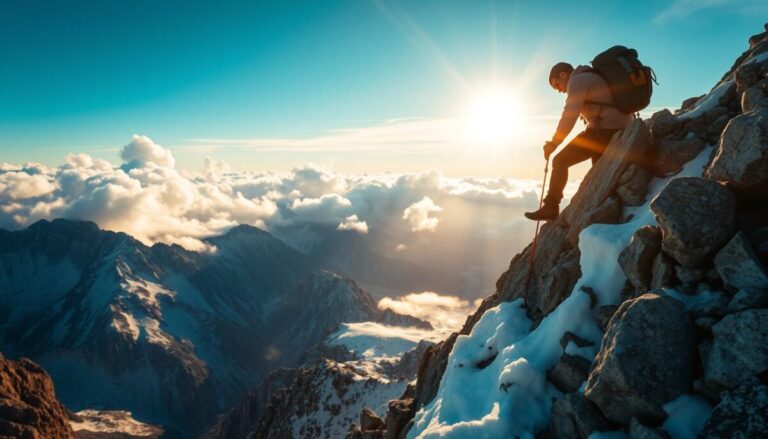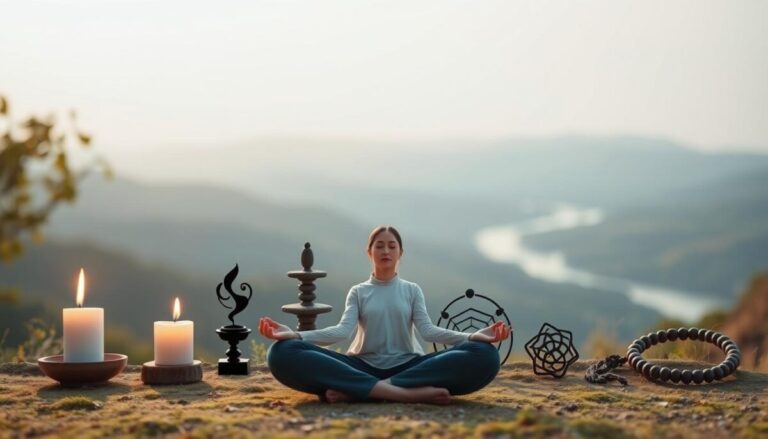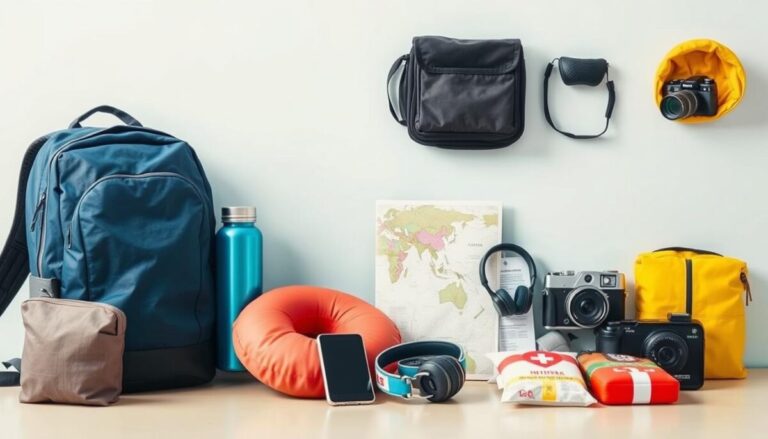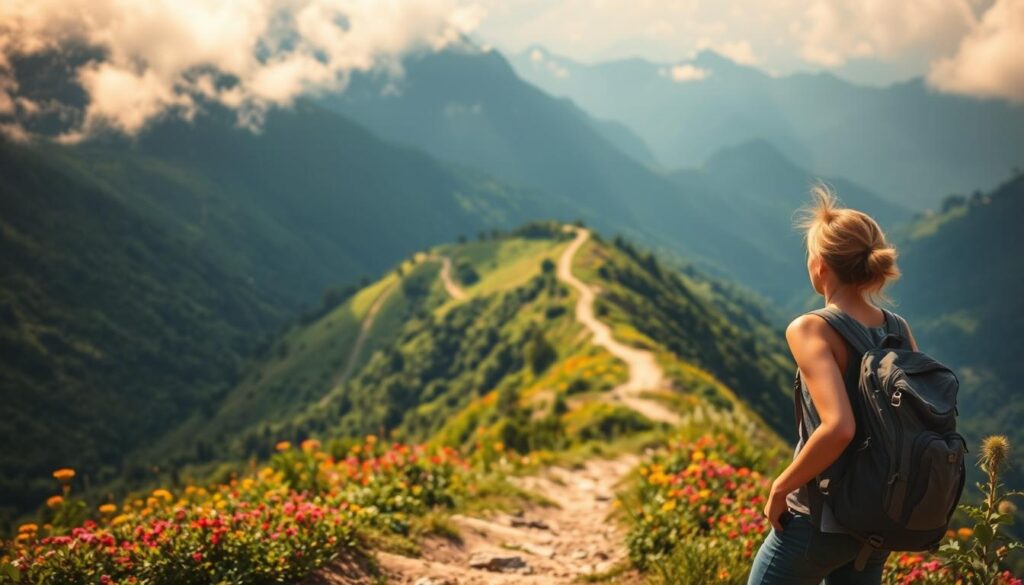
Starting your first solo travel journey can be thrilling and scary. You’re not just seeing new places; you’re also finding new parts of yourself. Solo travel lets you learn about new lands and cultures.
For a first-timer, the right advice is key. This solo travel guide will give you the tools you need for a great trip. You’ll learn how to get ready, find your way around, and enjoy your solo travel adventure.
Key Takeaways
- Understand the benefits and challenges of solo travel.
- Learn how to prepare for a solo trip.
- Get tips on navigating unfamiliar destinations.
- Discover how to stay safe while traveling alone.
- Find out how to make the most out of your solo travel experience.
The Transformative Power of Solo Travel
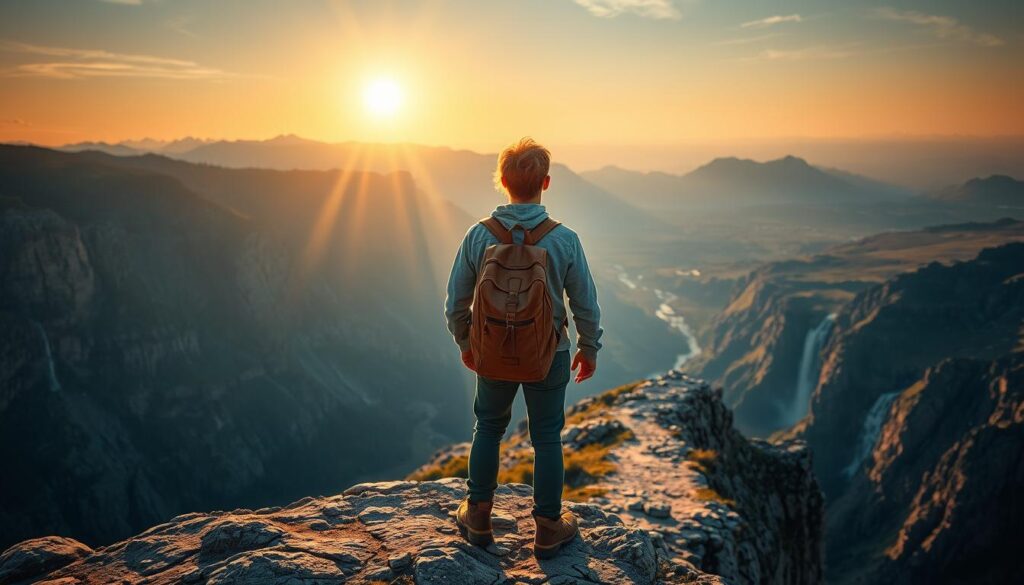
Going solo on a trip can change your life. It introduces you to new cultures, helps you grow, and gives you amazing stories to tell. You’ll find out more about yourself and the world.
Why More People Are Choosing to Travel Alone
More folks are traveling alone now. They want freedom, flexibility, and to test themselves. Solo travel lets you plan your own way, make quick choices, and dive deep into the journey.
Social media and online groups make solo travel easier. They help you meet others, share stories, and get tips for your trip.
The Unique Benefits of Discovering the World Solo
Solo travel brings many benefits that can change your life. Some key advantages include:
- Personal Growth: Facing challenges alone builds self-reliance and confidence.
- Cultural Immersion: Talking to locals and diving into cultures is easier when you’re alone.
- Flexibility: You can change your plans anytime or stay longer where you like.
| Benefits of Solo Travel | Description |
|---|---|
| Personal Growth | Develops self-reliance and confidence through overcoming solo challenges. |
| Cultural Immersion | Facilitates deeper engagement with local cultures and communities. |
| Flexibility | Allows for spontaneous changes in itinerary or extended stays. |
By choosing solo travel, you invite transformative experiences into your life. These experiences can make your life richer in many ways.
Preparing for Your First Solo Adventure
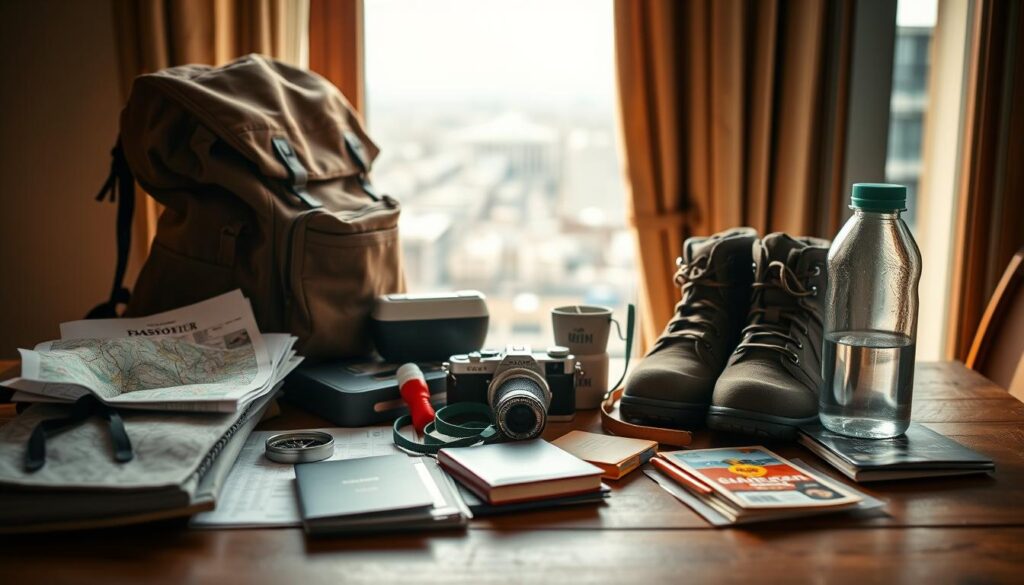
Starting your first solo trip? Get ready for a great time. Good planning helps you enjoy every moment without stress.
Selecting the Ideal Destination for First-Time Solo Travelers
Finding the right place is key for a good solo trip. Look for places that welcome solo travelers. Japan, Ireland, and New Zealand are great choices. They’re safe, rich in culture, and friendly to solo travelers.
Think about what you want from your trip. Do you want adventure, to learn about new cultures, or to relax? Pick a place that fits your goals.
Creating a Flexible Itinerary That Balances Structure and Spontaneity
Spontaneity is fun, but a basic plan helps too. Book your first few days, including where you’ll stay and how to get to your hotel. This gives you a sense of security as you start.
As you get more comfortable, add spontaneity to your trip. Mix planned activities with free time to explore. “The world is a book, and those who do not travel read only one page.” – Saint Augustine’s words remind us to be open to new things.
Essential Packing Tips for Solo Adventurers
Packing for solo travel means being ready without carrying too much. Pack clothes that can be mixed and matched, a versatile wardrobe. Don’t forget travel documents, a portable charger, and comfortable shoes.
- Travel documents (passport, visa, travel insurance)
- Portable charger and universal power adapter
- Comfortable walking shoes
- Layered clothing for varying weather conditions
- A small first-aid kit
By choosing the right place, planning your trip, and packing smart, you’re set for your first solo adventure. Enjoy the journey and learn as you go.
Valuable Lessons From Solo Travel That Change Your Worldview
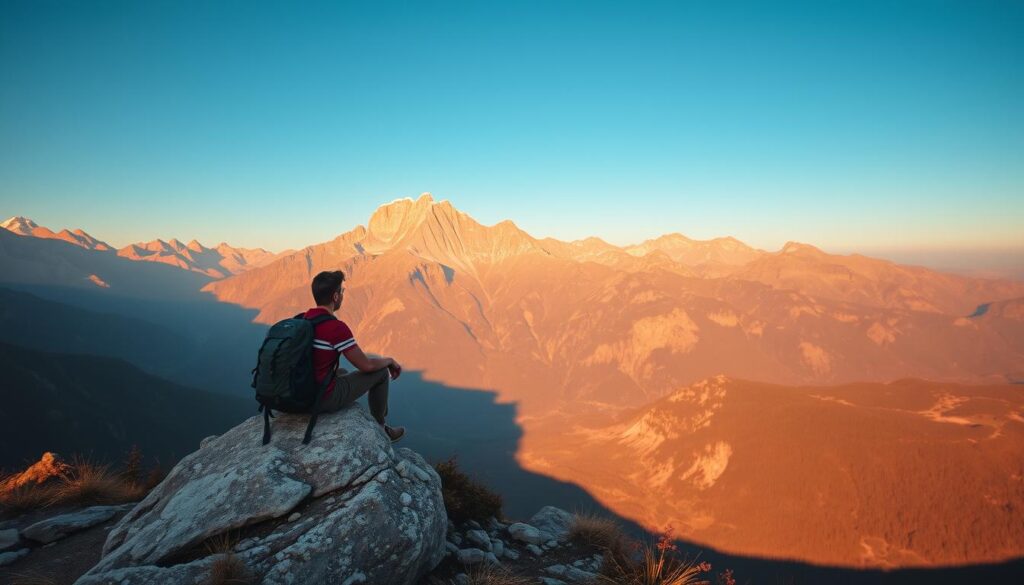
Traveling alone can change your life. You see new places and learn about yourself. It’s a journey of self-discovery.
Embracing Self-Reliance and Problem-Solving
Traveling alone teaches you to rely on yourself. You learn to solve problems and be independent. This self-reliance boosts your confidence and trust in yourself.
Dealing with challenges on your trip builds your resilience. You get better at handling uncertainty and turning problems into chances for growth.
Developing Cultural Sensitivity and Global Awareness
Solo travel lets you dive into different cultures. You meet locals and travelers, learning about their lives. This broadens your understanding of the world.
Exploring new places, you’ll see various cultural norms. Embracing these differences makes your travel stories richer and your worldview more open.
Finding Comfort in Solitude and Self-Reflection
Traveling alone helps you connect with yourself. You get quiet time for reflection. This solitude sparks personal growth, helping you find your values and goals.
Reflecting on your solo travels, you’ll discover new parts of yourself. You’ll appreciate the world’s diversity more. These quiet moments shape your journey and enrich your stories.
Navigating Safety Concerns When Traveling Alone
When you travel alone, knowing how to stay safe is key. Safety is a big deal for solo travelers. Being ready can make your trip better and safer.
Pre-Trip Safety Research and Preparation
Do your homework before you go. Learn about the place you’re visiting. Know the local customs and any travel warnings. Learn as much as you can before you leave. This will help you feel more ready and less stressed.
- Check the official government website for travel advisories related to your destination.
- Learn about local customs and cultural norms to avoid unintended offense.
- Familiarize yourself with local laws and emergency contact numbers.
Daily Safety Practices While on the Road
While traveling, follow some simple safety tips. Be careful with your stuff and don’t walk alone at night. Stay alert and aware of your surroundings.
- Keep your valuables secure and consider using a money belt.
- Avoid walking alone in dimly lit or isolated areas, at night.
- Keep your hotel room door locked and use the hotel safe for important documents.
Using Technology to Enhance Your Security
Today, technology can help keep you safe while traveling alone. From safety apps to GPS, there are many ways to stay connected and secure. Using the right tech can give you peace of mind and extra protection.
- Download safety apps that allow you to share your location with friends or family.
- Consider investing in a portable Wi-Fi hotspot for secure internet access.
- Use GPS tracking devices to keep tabs on your luggage or important items.
By doing your research, following safety tips, and using technology, solo travelers can stay safe. This way, you can enjoy your trip more and feel secure.
Building Meaningful Connections on the Road
Traveling alone lets you meet people from all walks of life. You can form deep connections that make your trip unforgettable. These connections can add value to your journey and leave lasting memories.
Where and How to Meet Fellow Travelers
Stay in hostels or Airbnb apartments to meet others. These places are great for making friends. Joining group tours or local events is also a good way to find like-minded people.
Tips for meeting fellow travelers:
- Stay in social hostels or guesthouses
- Participate in group tours or activities
- Attend local events or meetups
- Use social media or travel apps to connect with other travelers
Connecting with Locals for Authentic Experiences
Meeting locals can make your trip more real and meaningful. Stay in neighborhoods, eat at local spots, and join community events. Learning a few words in the local language helps too.
Benefits of connecting with locals:
- Gain insider knowledge of the area
- Experience local culture firsthand
- Develop meaningful relationships with the community
Balancing Social Time and Personal Space
It’s good to meet people, but keep your space too. Solo travel lets you set your own pace. Make sure to have time alone to recharge and enjoy your experiences fully.
By paying attention to your social and personal needs, you can have the best of both worlds. Whether you’re sharing stories or enjoying quiet time, your solo trip will be richer and more rewarding.
Managing the Emotional Journey of Solo Travel
Starting your solo trip, you’ll feel many emotions. You might feel excited, curious, or sometimes lonely. It’s key to manage these feelings to have a great time.
Overcoming Loneliness and Homesickness
Feeling lonely or homesick is normal while traveling alone. Staying in touch with family and friends helps a lot. You can also join groups or communities for solo travelers to meet others.
Learning to enjoy being alone is part of solo travel. Embracing quiet moments lets you think and grow. It turns loneliness into a chance for personal growth.
Dealing with Unexpected Challenges and Setbacks
Solo travel comes with its own set of challenges. Being flexible and ready for anything helps a lot. It’s useful for navigating new places or dealing with language issues.
Keeping a positive outlook and solving problems helps too. Seeing challenges as chances to learn makes you stronger and more confident.
Celebrating Personal Victories and Milestones
It’s important to celebrate your wins, no matter how small. Recognizing your growth boosts your confidence. It shows the good side of traveling alone.
Every achievement, like trying new foods or learning a language, shows your strength. Reflecting on these moments makes your trip even more special.
Documenting and Sharing Your Solo Adventures
Recording your solo travel is more than just documenting events. It’s about reflecting on how you’ve grown. As you travel alone, capturing your journey is a big part of the adventure.
By documenting your travels, you can relive your experiences. You can also share them with others, inspiring fellow travelers. This creates a lasting record of your journey.
Journaling Techniques for Meaningful Travel Reflection
Journaling is a powerful tool for solo travelers. Writing down your thoughts and feelings helps you process your adventures. It gives you insights into your personal growth.
- Set aside dedicated time each day to write in your journal.
- Include details about the places you visit, people you meet, and challenges you overcome.
- Reflect on your experiences, noting what you learned about yourself and the world around you.
For example, planning your itinerary helped you relax once you arrived. It included your top activities, accommodation, travel routes, and a loose plan.
Photography Tips for Solo Travelers
Photography is a great way to document your solo travels. Capturing moments through photos helps you remember your experiences vividly.
| Tip | Description |
|---|---|
| Invest in a good camera or smartphone with a quality camera. | Having the right equipment can make a significant difference in the quality of your photos. |
| Learn about composition and lighting. | Understanding these basics can help you take more compelling photos. |
| Take time to capture local culture and landscapes. | These photos can become meaningful memories of your travels. |
Responsible Social Media Sharing While Traveling Alone
Sharing your solo travel experiences on social media can inspire others. But, it’s important to do so responsibly.
Be mindful of the information you share, avoiding details that could compromise your safety or the privacy of others. Consider the impact of your posts on local communities and environments.
- Share your experiences in real-time or after you’ve left a location.
- Avoid geotagging sensitive locations.
- Be respectful of local customs and cultures.
By documenting and sharing your solo adventures thoughtfully, you can create a lasting record. You can also inspire others to explore the world.
Financial Wisdom for Independent Explorers
Solo travel is not just about bravery, but also about smart money management. As you prepare for your trip, knowing how to handle your finances is key. This way, your journey will be fun and worry-free.
Budgeting Strategies for Different Travel Styles
First, you need to make a budget. It should match your travel style, whether you’re a budget-conscious backpacker, a mid-range explorer, or a luxury traveler. Think about what you’ll spend on places to stay, food, getting around, and activities.
For example, staying in hostels can save you money compared to hotels.
| Travel Style | Daily Budget | Accommodation | Food |
|---|---|---|---|
| Budget | $30-$50 | Hostel | Street Food |
| Mid-range | $80-$120 | Budget Hotel | Local Restaurants |
| Luxury | $200+ | High-end Hotel | Fine Dining |
Money-Saving Tips That Don’t Compromise Experience
You don’t have to miss out on fun to save money. Eat at local places instead of tourist spots, use public transport, and look for free walking tours. Also, choose places to stay that offer free perks like Wi-Fi and breakfast.
- Use travel apps to find the best deals on places to stay and how to get around.
- Avoid exchanging money at airports or tourist areas where rates are bad.
- Travel during the off-season to save money.
Managing Financial Emergencies While Abroad
Even with good planning, money troubles can happen. Keep some cash safe, have a credit card with no foreign fees, and know how to get emergency funds from home.
Being ready and making smart money choices lets you enjoy solo travel without money worries. The secret to great solo travel is not just saving money. It’s also about making the most of your adventure.
Conclusion: Bringing Your Solo Travel Lessons Home
Traveling alone can change your life in big ways. You learn to rely on yourself, understand different cultures, and get to know yourself better.
Looking back on your solo trips, you’ll see how they’ve helped you grow. You’ll feel more confident, meet new people, and face challenges head-on. These experiences broaden your view of the world.
Using what you learned from solo travel can make your everyday life better. It makes you stronger, more open, and more confident. These skills help in your career, relationships, and dealing with life’s ups and downs.
When you bring these lessons back home, you’ll keep wanting to explore and learn. You’ll grow as a person and connect better with others.
FAQ
What are the benefits of solo travel?
How do I prepare for my first solo trip?
What are some essential packing tips for solo travelers?
How can I stay safe while traveling alone?
How can I meet new people while traveling solo?
How do I manage the emotional challenges of solo travel?
What are some tips for documenting and sharing my solo travel experiences?
How can I manage my finances while traveling solo?
What are some valuable lessons that can be learned from solo travel?
Share :
You Might Also Like

